Part 1. How to find a reliable freight forwarder?
Part 2. How many modes of transportation are there from China to Germany?
Part 3. How to save money?

Sometime is hard to find a reliable business partner to do business among the thousands of companies available in the market at this moment, and this is what freight forwarders are for. Having a freight forwarder it would make a great difference when you don’t have enough time and energy, experience or you just want to avoid all the troubles this process might bring you sometime such as document preparation or cross-see transportation process problems. They will use their industry expertise to reduce costs and help you find solutions to any transportation problems.
If you want to save time and money while making an international delivery from China to Germany by air, sea or land, consider using a freight forwarding agent. A freight forwarder will make sure that your freights will arrive on time and in the right conditions.
If you are an occasional carrier who knows little about international transport, we also recommend you to find a cargo agent who will be able to help you in this complex process. They have years of expertise and experience in this field, and you will be able to save more time and money than if you ship by yourself.
If you are looking for a freight forwarder to handle your shipping from China to Germany, whether you want air shipping, sea shipping, or multimodal transportation it is always best to choose a freight forwarder from China. The Chinese freight forwarder is the ideal choice for overseas transporters because it has the advantages of language and geography.
In the shipping process, you will also need a Chinese warehouse for storage and preparation. Choosing a local forwarder (from Germany) will cost you a lot of time and money, because they will probably need to contact another agent in China to handle the picking, preparation, storage, and customs clearance; and also the language barrier will be an issue.
Time, money and the success of your shipment from China to Germany is what matters. Finding a reliable freight forwarder for your shipping can be a hard task. In general, there are a couple of questions you can ask the freight forwarder or yourself to assess whether he is qualified for your transportation or not:

1) Does the freight forwarder have a business license from the Chinese government? – Having a business license makes everything legal and transparent for you.
2) Does the freight forwarder have an official website, and has a good ranking on Google? – On their website, you can find the necessary information about their services and costs. Not to mention that in these modern days, Google reviews are a must-have for any company that respects itself and cares for its customers.
3) Does the company have a good insurance plan? – Having a good insurance plan is very important because it will compensate for your merchandise if any damage occurs in shipment or warehousing.
4) Do they have a complete cargo tracking system to update your cargo progress in real-time? – Finding a cargo shipping partner that offers cargo tracking is crucial because you can see in real-time where your shipping is and how much it takes to arrive at the final destination.
5) You can also ask them to provide the most recent shipment record or bill of lading – A bill of lading contains all relevant details about the type, amount, condition, and destination of the goods.
6) During the consultation, were the responses prompt, with professional advice and explanations? – If you are convinced by their services, but you still have some doubts about the process, is best to try the freight forwarder with a shipment of small goods. This way, if anything goes wrong, you won’t lose a big amount of money.
Before talking about the modes of transportation is good to know what standards and regulations apply in Germany, and also which are restricted and prohibited goods.
Germany has employed strict rules to safeguard consumers, which includes monitoring the imports into the country. For example, if you want to import plants or their products from China to Germany, you will be required to register with the relevant authorities; this helps in monitoring and preventing the spread diseases and pests.
If you want to import jewelry and toys (non-food items), you will have to obtain a specific license from the German Federal Office of Consumer Protection and Food Safety.
If you are importing any electrical or electrical equipment, you need to be registered by the Elektro-Algeräte Register (EAR) foundation.
You should get to know what you cannot import to Germany from China because importing prohibited cargo will result in the customs authorities’ confiscating your load.
This is what is prohibited in Germany: any product that contains biocide dimethylfumarate (DMF), certain carcinogenic substances, certain Chemicals subject to the chemical weapons convention (CWC), certain pesticides subject to the Rotterdam Convention, certain Products subject to convention on International Trade in Endangered Species of Wild Fauna and Flora (CITES), chlorofluorocarbons (CFCs), counterfeit coins and banknotes, counterfeit or pirated goods, fighting dogs, flick and gravity knives, fully automatic weapons, goods bearing false origin statements, goods infringing a copyright, goods infringing a trademark, green and black tea of Public Republic of China origin, live animals, offensive weapon (belt buckle knives, throwing stars, martial arts equipment, and pepper and similar sprays), ozone-depleting substances, rabies susceptible animals, and so on.
This is what constitutes Germany’s top imports from China: motor vehicles, trailers, and semi-trailers, computer and accessories, optical products, machinery and equipment, electrical equipment, chemicals and chemical products, basic metals, crude petroleum and natural gas, basic pharmaceutical products, food products.
There are numerous options for transporting goods in Germany. When you’re planning the shipment process such as costs, shipment urgency, the value of the goods being shipped, and also the size and weight of the package, the mode of transportation is an important aspect, which needs to be evaluated. Each option of transport has advantages and disadvantages.
Prioritizing your needs, understanding the shipment process and comparing costs is important when you are planning your shipment, and by choosing the right mode of transportation you can significantly optimize your cargo flow.
After selecting your freight forwarder or a cargo agent, the collaboration between the two parts will begin. An experienced China-Germany freight expert will have excellent communication skills understanding all your requirements, including time, budget, and mode of transportation.
Express delivery is a relatively easy way to transport goods. Studies have shown that 95% of product samples and a small amount of high-value goods are sent by courier.

If you have an urgent and quick delivery, express shipping is the best option, because in general, the delivery time in express delivery ranges from one to three days, compared to two to eight days in standard shipping.
For a shipment to be delivered in Germany with FedEx, UPS, or DHL it takes only one to four working days.With this type of delivery, you don’t have to worry about customs clearance or taxes, but because express shipping means urgent and faster delivery, the price and rates are higher than other forms of transportation. Also, the cost of express shipping may increase during the holidays, but it can drop dramatically in the off-season.
Freight forwarders can find an express company that gives you a reasonable price, and he can also get a discount price that you won’t find on their official website. With express delivery, shipping freight under 100 kg from China to Germany is cheaper and faster.
You always have to plan your shipment in advance, especially when you have a large load (over 500 kg), or the size of the products occupy more than two cubic meters. In general, sea shipping is the best choice for transporting a large load. However, it is also the most complicated mode of transportation, and it takes a long time. From China to Germany, sea shipping time is estimated at around 25 to 41 days from port to port, and 42 to 47 days from door to door delivery.
In China, there are several ports such as Shanghai port, Ningbo port, Shenzhen port, Tianjin port, Qingdao port, Xiamen port, and Hong Kong port, from which your shipping can leave to Germany. If your freight forwarder is located in these cities, you will have the advantage that he will be more familiar with the loading and unloading rules of each port, making it easier to handle your goods, saving you time.
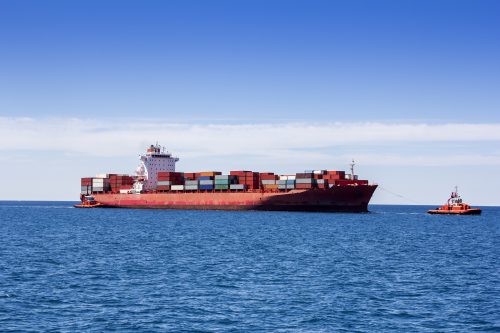
The top ports for importing in Germany are Hamburg port, Bremerhaven port, and Bremen port.Sea freight shipping is the best option for bulk goods transportation, sometimes being the only option. When importing from China, you can choose Full Container Load (FCL), or Less than Container Load (LCL) if your overall cargo volume doesn’t meet one full container requirement.
When it comes to size, there are three types of containers 20 ft., 40 ft. and a 40 ft high cube container. The 20 ft. containers are designed to carry more weight such as minerals, metals, machinery, sugar, paper, cement, etc., while the 40 ft. containers are designed to carry voluminous cargo rather than heavy cargo, for example, furniture, steel pipes, paper scrap, cotton, tobacco, etc.
You should use LCL if you don’t have enough goods to fill a 20′ or a 40′ container (FCL). This enables importers to ship smaller amounts of cargo, which doesn’t have the right volume to make Full Container Load a viable option. This means your cargo is combined with other shipping cargos for the same destination. When combining several shipments in one container, your freight forwarder needs to do more work. LCL freight is calculated in cubic meters (CBM) and charged based on the volume.
Full Container Load refers to when the quantity of your goods is large enough that they can be put in at least one container. In this case, the freight is calculated on an FCL basis. FCL shipment will be loaded and sealed at origin by your supplier, then shipped to your final destination.
Although 90% of goods are shipped by sea, when importers and exporters need to move high-value goods to Germany quickly and reliably such as seasonal goods, clothing, electronics, and/or products that cannot be near water, they use air freight. If your load is around 100 kg, air freight becomes the cheaper option. In a matter of days, air freight can bring your cargo from a factory floor in China, to your destination. Air transport reduces the shipping time between China and Germany to 5 to 8 days for port to port delivery, and 6 to 13 for door to door delivery. The most important airports in Germany are Frankfurt airport, Munich airport, Dusseldorf airport, and Berlin Tegel Airport.
There are two methods to calculate the air freight price. The first method is cost per kilogram multiplied with the cargo weight, and for the second one, for low-density cargo (low weight and high volume) you will be charged based on the volume it occupies.
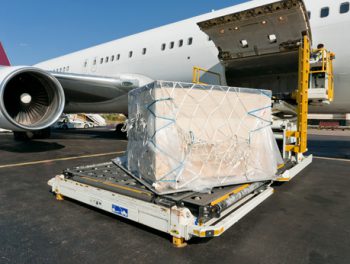
There are two classes of Airfreight
After you have established your mode of transportation for your goods you are ready for the next step, which implies understanding the terms FOB, EXW, CIF, and DAP. Because in the same transport model, transport cost is a crucial factor, understanding those terms will help you save money.
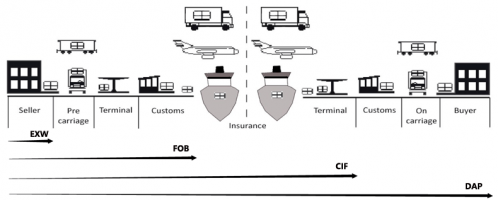
Many websites use the quotations FOB, EXW, CIF, and DAP. In general, these quotations include information about where your cargo is being shipped to and from, the transport mode and equipment being used, shipment details such as dimensions, weight and a description of the goods.
FOB means free on board or freight on board and is an international shipping agreement used in the transportation of goods between a buyer and a seller. FOB is the primary mode of Alibaba’s quotation, which means that your Chinese supplier will be responsible for the transportation from the Chinese factory to the Chinese loading and unloading port. For example, if you see FOB Ningbo – Ningbo is a city and a port in China, and it means that this is the port that the supplier will ship your order to, which is covered by the FOB price, and from here, you are responsible for the freight. The freight is divided into two aspects – the first one is from China airport/port to the German airport/port, and the second one is from the German airport/port to your doorstep.
EXW stands for Ex Works. If you see this quotation on the website you are buying from, it means that the seller is making the goods available at their premises, or another named place. In other words, EXW means that your freight has been increased one step, and you will be responsible for the transportation from the factory in China to the loading port in China. This is an aspect your Chinese freight forwarder will help you manage.
Your shipping costs will divide into three categories – From China factory to China airport/port – from China airport/port to Germany airport/port – from Germany airport/port to your doorstep. Over this, other transportation costs will be added such as Chinese export costs and customs clearance costs. Finding a reliable freight forwarder is important because he will let you know where every cost is going, with no hidden expenses.
CIF stands for cost, insurance, and freight, and it means that the supplier is responsible for all transportation costs from the factory in China to the airport/port in Germany, including insurance.
In other words, CIF is an expense paid by the seller to cover the costs, insurance, and freight if a package or item is lost or damaged while it is in transit to an export port. The seller must cover other expenses such as additional customs, export paperwork, inspections or rerouting, but once the freight is loaded, you (the buyer) become responsible for all other costs, including the expenses from the German airport or port to your doorstep. With CIF the supplier adds an extra charge to compensate for their efforts, and it becomes more expensive than FOB.
It will save you time and money if you find a freight forwarder, because usually, the suppliers in China will also find a freight forwarder to deal with the whole process, and they cannot professionally update the status of your goods promptly.
The last one is DAP, which stands for delivery at place or destination delivery. If you see this quote on the website you are buying from, it means that the seller will handle all the charges and the delivery to the buyer facilities, but the import taxes will be paid by the buyer at the destination.
Once the goods are ready for shipment, the packing is done by the seller at his own cost, then the goods are moved to customs location opted by the seller at exporting country at his expenses under DAP terms. All the necessary legal formalities in the exporting country are completed by the seller at his costs and risks, also the insurance up to the destination (Soth Africa) is arranged by the seller. If it’s not mentioned in the contract, the unloading cost at the final destination has to be borne by you (the buyer).
In other words, the seller is responsible for all the expenses and risks to deliver the goods up to the destination mentioned in the contract. From the destination mentioned in the contract, it becomes the buyer’s responsibility for the goods to reach his premises at his own expense.
But even if the seller is responsible for all the shipping steps, he can’t do detail work such as warehousing, labels, and goods inspection, so it is best to find a reliable freight forwarder, to help you with the detail work.
Therefore, the best way to save money and time is by choosing FOB or EXW, because your goods will be in professional hands, with the lowest price, and the fastest time to reach your destination.
Different goods attract different taxes, and you need to understand the duties and taxes that apply to your goods when importing to Germany. The taxes that you will pay are calculated based on the CIF value of your imports – when importing industrial goods you will pay a general tax of 4.2% that the customs charges these goods, and on top of that you will also be paying and import sales tax of 19%. If you are importing food products, pieces of art or newspapers, you will have to pay a 7% tax. If you are importing fabric and clothes you will have to pay a 17.3% tax.
In general, paying special attention to the charges will save you money. If you want to transport goods via express delivery and air freight you should take into consideration these rules because the costs can be high – the weight is calculated in kilograms (kg), and the volume is calculated in cubic meters (CBM).
A) Calculating the actual weight – If the actual weight of the goods in kilograms is more significant than its dimensional weight, it will be calculated like this:
Actual weight of the package x cost per kilogram (this price varies from company to company).
B) When the volume of the goods is larger than the actual weight is called dimensional weight – this is an estimated weight calculated by multiplying the length of the package with the width and height divided by a dimensional factor, also called a DIM divisor. Dimensional factors are numbers set by the major freight carriers, and represent cubic inches per pound.
The dimensional weight is the weight of the package at the minimum density accepted by the carrier.
Dimensional weight = length × width × height/dimensional factor
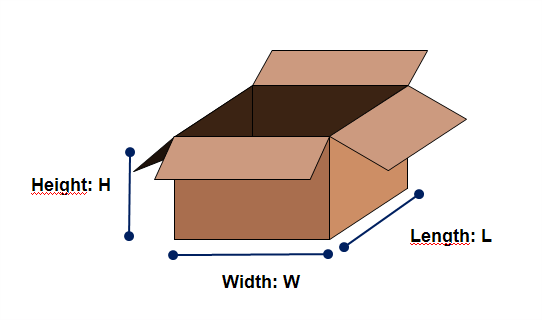
International transport and logistics companies are based on the maximum value they can charge. For example, freight carriers like USPS, FedEx, or UPS calculate shipping charges based on whichever number is greater (actual weight or dimensional weight) – if you have a package that has the actual weight less than 31 kilograms (let’s say 29 kg), the freight carrier will charge for the dimensional weight of 31 kilograms since it is the greater number. For them, whichever number is higher becomes your billable weight. Therefore, in some cases, to save money it is necessary to compress the package to reduce the measurement volume.
Finding an experienced freight forwarder will give you the most cost-effective solution promptly, and will save you money and time.
In international transportation, you always have to plan your shipment in advance because the delivery time of your goods is the crucial factor that decides the mode of transportation. Also knowing the holidays’ schedule in China and important shipping deadlines and guidelines will save you time and money because in those peak periods the shipping prices are usually higher and the factories are closed.
Here are some examples of peak seasons for shipping from China to Germany:
If your shipment is not urgent, you will save money and you will also have time to face unplanned delays such as congestion, blockages, supplier issues, and documentation mistakes. You can also ask questions surrounding the company’s response to delays, to see if they have procedures for resolving these issues.
If air freight is too expensive, but sea freight cannot be delivered in time, you can cooperate with the freight forwarder, who can offer the option of multimodal transportation combining air freight and sea freight with other forms of ground transportation (trucks, trains, or some other mean of transport) for the delivery.
Multimodal transportation also known as combined transportation is the transportation of goods with at least two different modes of transport, under a single contract. Legally speaking, the carrier is responsible for the entire transport, and he does not have to possess all the means of transport. He is also known as a multimodal transport operator. This mode of transportation might induce certain costs for transshipments and handling, but it also comes with many advantages such as centralization of responsibility in one transport operator, economies of scale in transport negotiations, use of international experience in transportation, in the field of bureaucracy and commerce, better use of available infrastructure and more efficient means of transport, focused on cost reduction, and reduction of indirect costs (e.g. human resources).
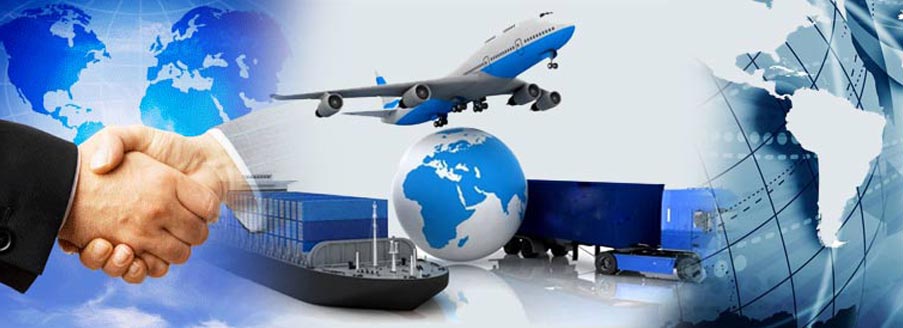
Finding the right freight forwarders is a must again because they can often work within their contacts in your advantage to find a way to achieve this goal faster and cheaper. This hybrid solution will deliver the goods in the correct time frame and keep your shipment on budget.
Regardless the mode of transportation you chose from China to Germany, this process is always complicated and it involves many steps such as warehousing, document preparation, customs issues, cargo insurance and so on.
Even if, with the rapid development of international trade, the international logistics industry has also grown, choosing an experienced and reliable freight forwarder is the key to solve the problem of international transport.
China Freight is based on customer gain, placing customers first and offering them the best shipping possible from China to Germany through our freight forwarders experts. We have experience, airline relations, customs reputation, competitive prices and timely delivery. Our success is based on integrity and responsibility.
If you‘re ready to start your shipping process click here for more information and offers.
